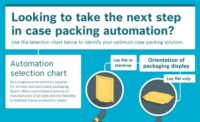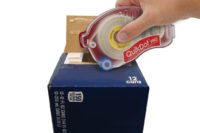Materials Technology: Adhesives & Tapes
The right adhesive will ensure a package’s integrity
Ensuring integrity through production, during transit and at retail.








Adhesives and tapes are used for practically anything that is packaged – such as snack foods and candy – for labeling and reseal tabs to multipacking and case sealing. Adhesives have a big job and must meet packager, retailer and consumer needs. Those that fail can lead to product loss, shipping issues, equipment slow-downs and consumer complaints.
According to a report by MarketsandMarkets (marketsandmarkets.com), the pressure-sensitive adhesive market is expected to see a worth of U.S. $11.22 billion by 2021, at a CAGR of 6.1% between 2016 and 2021. It is no surprise that labels are the largest application segment. They are widely used in many industries and estimated to see the largest market share.
As the market grows, you may be wondering if a new adhesive or tape is necessary to keep your line at tip-top shape or your label from, well, falling off or deteriorating. Here are just a few sticky innovations that might be worth considering.
A new wine and beverage label adhesive just launched from Wausau Coated Products (wausaucoated.com). The H-318 adhesive was created with a soft look and feel, to survive moisture and water environments, as well as limit bubbles and wrinkles in the label.
While providing good convertibility for printing, the H-318 also uses an adhesive blend that creates an aggressive permanent bond with the container. This adhesive inhibits water absorption and avoids defects in paper presented to water. Wausau makes it easy for wineries, breweries and distilleries to leave the film/paper combination or special coatings behind. H-318 is available within Wausau’s wine and spirits line of pressure sensitive labels.
Recently launched by Nordson Corp. (nordson.com), the new PureFlow™ hoses aim to improve adhesive performance by reducing material degradation. When adhesive sits inside of a typical heated hose, it begins to degrade. The effects of this degradation include charring, discoloration, curing and odors. Degradation of adhesive can impact the final product quality, as the adhesive color and odor can change in undesirable ways. Reactive PUR adhesives tend to cure within heated hoses and restrict flow, requiring frequent hose replacements. PureFlow hoses are designed to protect against these effects, which prolongs the useful life of the hose as a result.
PureFlow hoses are compatible with standard hot melt adhesives, reactive hot melt adhesives and most heated fluids, such as perfumes and lotions. RediFlex II hangers are built onto standard PureFlow hoses to give users a way to easily install, move and replace hot melt hoses.
Packaging tapes will also see the tall end of the stick in terms of growth, says Technavio (technavio.com). Global growth is expected at a CAGR of more than 5% by 2020. Parcel tapes (medium-strength tapes used to package products in corrugated boxes) will see the greatest climb.
Properly securing a case is a critical part of the packaging process. 3M’s (3m.com) latest adhesive technology, Scotch® Clean Removal Strapping Tape 8899 HP, boasts a long-lasting hold to secure parts during shipping and clean removal to ensure no residue or damage. 3M reports it is resistant to hot, cold, moisture and scuffs without leaving behind residue. The Strapping Tape can be applied by hand or dispenser, and uses less tape without sacrificing securement during shipping. Because it ensures a secure hold using less tape, it can reduce costs. Designed with 3M’s proprietary pressure-sensitive rubber adhesive, it can be applied to and adhere to common surfaces, such as vinyl, painted metal, stainless steel, plastic and glass. 3M Scotch Clean Removal Strapping Tape 8899HP is available in a variety of widths and colors.
Shurtape (ShurSEALSecure.com) has expanded its ShurSEAL® Packaging Solutions line with the Folded-Edge Hand Dispenser. For manual sealing applications, including L-Clip tape sealing, the dispenser’s Folded-Edge Technology enhances tape application for a more reliable, secure case seal and ready-to-open seals. The technology folds both edges of the packaging tape along the length of the carton as it’s applied. The Folded-Edge Dispenser has a retractable/pivoting safety blade that is shielded from personal contact and a two-step process ensures the blade is exposed only during deliberate cutting. No need to worry about unnecessary tape use – the visible tape length indicators provide tab length control, so users can see how much is being dispensed.
ShurSEAL packaging solutions are designed to reduce material waste; improve overall equipment effectiveness; increase safety and content security; and reduce maintenance costs.
For manufacturers that rely on manual case sealing or those who like machine-assisted sealant delivery systems on their packaging line, there are many choices. Remember to consider all of your needs from label or product sealing down to end of line case sealing.
|
Is Your Packaging Line Obstructed? It’s a fact: Manufacturers contend with problems on their packaging lines that are negatively impacting their operational efficiencies. These problems are so commonplace, they are often overlooked and planned for when budgeting downtime, waste and more. Shurtape shares four case sealing issues that may be obstructing your line:
|
Looking for a reprint of this article?
From high-res PDFs to custom plaques, order your copy today!











